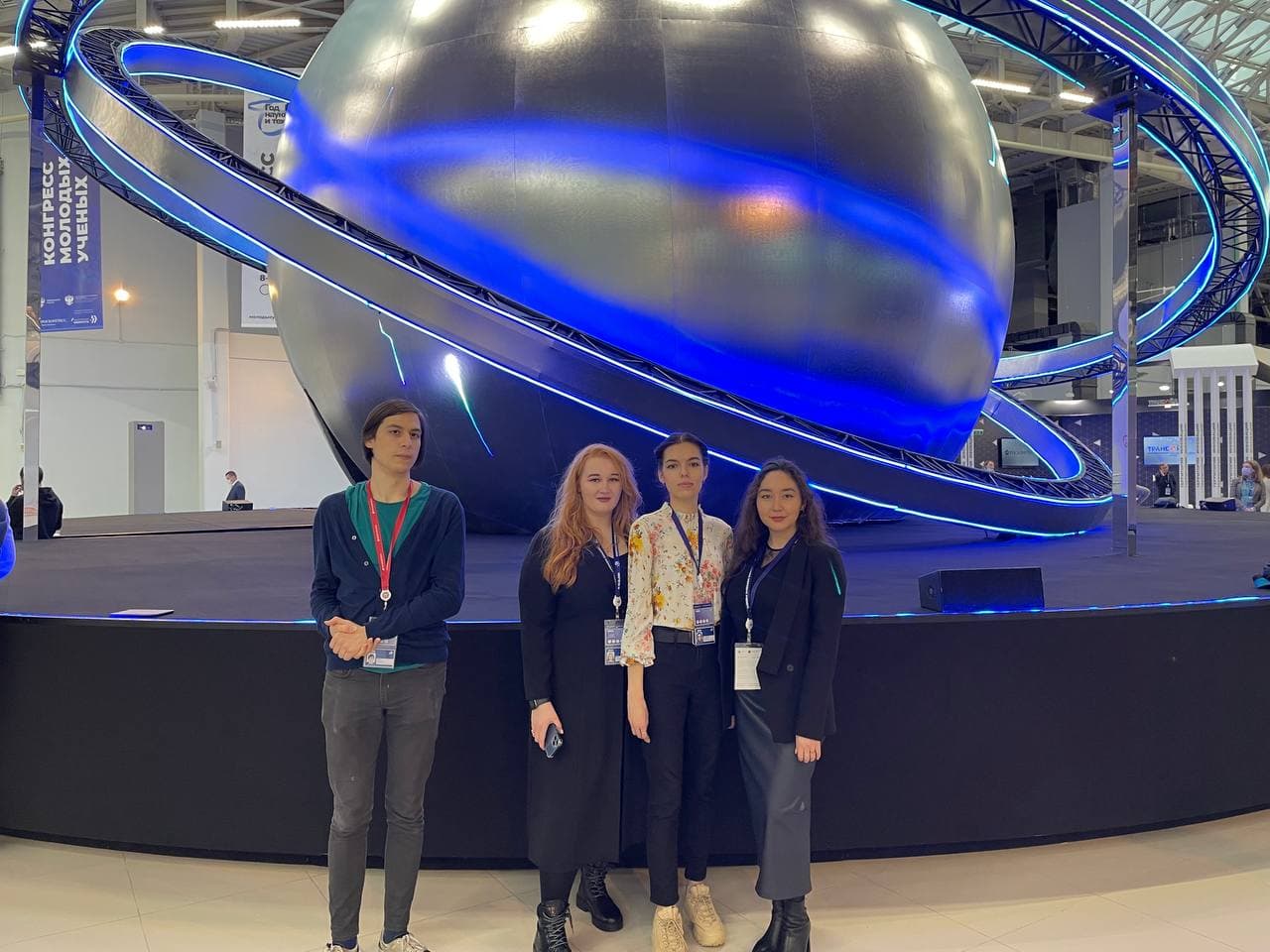RUDN students calculated the ecological footprint at the Congress of Young Scientists

RUDN University volunteers:
- Pavel Kumandin (second-year student of the Master’s degree in Chemistry, Faculty of Science);
- Alexandra Antonova (second-year student of the Master’s degree in Chemistry, Faculty of Science);
- Anna Samoilova (third-year undergraduate student of International Law, Law Institute);
- Karina Sibagatullina (student of the third year of Bachelor’s degree in International Law, Law Institute).
Everything that people use for life is produced by our planet. Humanity takes a certain area from nature, on which the waste of activity is then stored. To determine how much the population influences nature, scientists have developed the “ecological footprint” methodology to calculate the degree of human impact on the environment.
The scientific volunteers of the RUDN conducted a survey among the participants of the exhibition according to the following criteria:
- housing area;
- modes of transportation (car/public transport);
- type of car and engine (passenger car/SUV; petrol/diesel engine; electric vehicle);
- number of trips and type of transport per year (plane/train/car);
- type of food (vegetarian/raw food/vegan).
The average indicator of the ecological footprint of all the interviewed participants of the Congress was 16.4 tons of carbon per year — this is several times more than the norm.
“The idea to gather the most interested and active young scientists from all over the country at the Congress immediately aroused enthusiasm. So I went there with the expectation of something cool, filled with the atmosphere of science. And these expectations have paid off with a vengeance! The event was really large-scale and bright, as well as well-planned and organized.
Important and relevant topics were raised during the discussions and in the reports of the participants. First of all, about building activities in a multidisciplinary way, cooperation between representatives of different scientific fields and comprehensive research.
I think that such projects are useful for raising people’s awareness of how they can, by changing their own lifestyle and daily habits, influence acute environmental problems,” Pavel Kumandin, a second-year student of the Master’s degree in Chemistry, Faculty of Science.
For reference:
The Congress of Young Scientists is an event within the framework of the Year of Science and Technology. It brought together representatives of leading scientific schools from different regions of Russia, young scientists, winners of grant competitions, students and schoolchildren who have achieved significant results in their research.
The Congress was organized by the Ministry of Science and Higher Education of the Russian Federation, the Coordinating Council for Youth Affairs in the Scientific and Educational Spheres of the Presidential Council for Science and Education and the Roscongress Foundation.
RUDN University summed up the results of the competition among scientific student societies and scientific circles. The GreenLab of the Institute of Ecology became the best Student Research Society, the second place was taken by the Institute of Foreign Languages, and the third place - the Faculty of Humanities and Social Sciences.
There are approximately 1,600,000 children in Russia with confirmed attention deficit hyperactivity disorder. The necessary therapy is not always available to their families due to cost or the lack of specialized centers nearby. Teachers and students at RUDN University and Altai State University have developed a special app for these children that increases attention and reduces anxiety using the color photostimulation method.
Student science and popularization tour club has been operating at the Institute of Environmental Engineering for five years now. It was established under the auspices of the GreenLab Student Scientific Society.
RUDN University summed up the results of the competition among scientific student societies and scientific circles. The GreenLab of the Institute of Ecology became the best Student Research Society, the second place was taken by the Institute of Foreign Languages, and the third place - the Faculty of Humanities and Social Sciences.
There are approximately 1,600,000 children in Russia with confirmed attention deficit hyperactivity disorder. The necessary therapy is not always available to their families due to cost or the lack of specialized centers nearby. Teachers and students at RUDN University and Altai State University have developed a special app for these children that increases attention and reduces anxiety using the color photostimulation method.
Student science and popularization tour club has been operating at the Institute of Environmental Engineering for five years now. It was established under the auspices of the GreenLab Student Scientific Society.